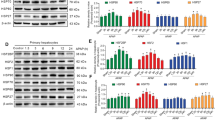Abstract
During cold stress, liver cells undergo apoptotic injury as a result of oxidative stress. Heat shock 70 kDa protein (Hsp70) is a protein involved in modulating a variety of physiological processes, including stress responses, proliferation, and apoptosis. In addition, Hsp70 regulates apoptotic signaling pathways in different manners, promoting or suppressing apoptosis. In this study, we investigated the effects of Hsp70 overexpression on hydrogen peroxide (H2O2)-induced apoptosis of Buffalo rat liver (BRL) cells and the underlying mechanisms of these effects. Our results show that in comparison with the control group, Hsp70 overexpression displayed increased protein levels of Bcl-2, and decreased cytochrome c (Cyt c), cleaved caspase 3, and cleaved caspase 8, but no apparent differences were found in levels of Bax. Furthermore, Hsp70 overexpression significantly suppresses the amount of apoptotic cells. Such findings indicate that overexpression of Hsp70 inhibits H2O2-mediated activation of caspase 8 and caspase 3, upregulates the expression of Bcl-2 which is a known anti-apoptotic protein, and decreases the release of Cyt c from the mitochondria into the cytoplasm, collectively decreasing cell apoptosis.








Similar content being viewed by others
References
Beere HM, Wolf BB, Cain K, Mosser DD, Mahboubi A, Kuwana T, Tailor P, Morimoto RI, Cohen GM, Green DR (2000) Heat-shock protein 70 inhibits apoptosis by preventing recruitment of procaspase-9 to the Apaf-1 apoptosome. Nat Cell Biol 2:469–475
Chen Z, Chua CC, Ho YS, Hamdy RC, Chua BH (2001) Overexpression of Bcl-2 attenuates apoptosis and protects against myocardial I/R injury in transgenic mice. Am J Physiol Heart Circ Physiol 280:H2313–H2320
Cohen GM (1997) Caspases: the executioners of apoptosis. Biochem J 326(Pt 1):1–16
Dai S, Jiang L, Wang G, Zhou X, Wei X, Cheng H, Wu Z, Wei D (2010) HSP70 interacts with TRAF2 and differentially regulates TNFalpha signalling in human colon cancer cells. J Cell Mol Med 14:710–725
Davies KJ (1999) The broad spectrum of responses to oxidants in proliferating cells: a new paradigm for oxidative stress. IUBMB Life 48:41–47
Huang HL, Fang LW, Lu SP, Chou CK, Luh TY, Lai MZ (2003) DNA-damaging reagents induce apoptosis through reactive oxygen species-dependent Fas aggregation. Oncogene 22:8168–8177
Li G, Scull C, Ozcan L, Tabas I (2010) NADPH oxidase links endoplasmic reticulum stress, oxidative stress, and PKR activation to induce apoptosis. J Cell Biol 191:1113–1125
Park HS, Lee JS, Huh SH, Seo JS, Choi EJ (2001) Hsp72 functions as a natural inhibitory protein of c-Jun N-terminal kinase. EMBO J 20:446–456
Perkins CL, Fang G, Kim CN, Bhalla KN (2000) The role of Apaf-1, caspase-9, and bid proteins in etoposide- or paclitaxel-induced mitochondrial events during apoptosis. Cancer Res 60:1645–1653
Ravagnan L, Gurbuxani S, Susin SA, Maisse C, Daugas E, Zamzami N, Mak T, Jaattela M, Penninger JM, Garrido C, Kroemer G (2001) Heat-shock protein 70 antagonizes apoptosis-inducing factor. Nat Cell Biol 3:839–843
Ryter SW, Kim HP, Hoetzel A, Park JW, Nakahira K, Wang X, Choi AM (2007) Mechanisms of cell death in oxidative stress. Antioxid Redox Signal 9:49–89
Sahin E, Gumuslu S (2004) Cold-stress-induced modulation of antioxidant defence: role of stressed conditions in tissue injury followed by protein oxidation and lipid peroxidation. Int J Biometeorol 48:165–171
Sahin E, Gumuslu S (2007) Stress-dependent induction of protein oxidation, lipid peroxidation and anti-oxidants in peripheral tissues of rats: comparison of three stress models (immobilization, cold and immobilization-cold). Clin Exp Pharmacol Physiol 34:425–431
Singh M, Singh N (2008) Induction of apoptosis by hydrogen peroxide in HPV 16 positive human cervical cancer cells: involvement of mitochondrial pathway. Mol Cell Biochem 310:57–65
Troyano A, Sancho P, Fernandez C, de Blas E, Bernardi P, Aller P (2003) The selection between apoptosis and necrosis is differentially regulated in hydrogen peroxide-treated and glutathione-depleted human promonocytic cells. Cell Death Differ 10:889–898
Vogel A, van Den Berg IE, Al-Dhalimy M, Groopman J, Ou CN, Ryabinina O, Iordanov MS, Finegold M, Grompe M (2004) Chronic liver disease in murine hereditary tyrosinemia type 1 induces resistance to cell death. Hepatology 39:433–443
Xiao WM, Jiang BM, Shi YZ (2004) Mechanisms of heat shock proteins inhibiting C2C12 cell apoptosis induced by hydrogen peroxide. Zhong Nan Da Xue Xue Bao Yi Xue Ban 29:6–10
Zhu, T., R. Chen, A. Li, J. Liu, D. Gu, Q. Liu, C. C. H, and J. Zhou (2006) JWA as a novel molecule involved in oxidative stress-associated signal pathway in myelogenous leukemia cells. J Toxicol Environ Health A 69:1399–411
Zhuang S, Yan Y, Daubert RA, Han J, Schnellmann RG (2007) ERK promotes hydrogen peroxide-induced apoptosis through caspase-3 activation and inhibition of Akt in renal epithelial cells. Am J Physiol Renal Physiol 292:F440–F447
Acknowledgments
This work was supported by the Natural Science Foundation of Heilongjiang Province (Grant No. C2015041), National Natural Science Foundation of China (Grant No. 31372398), and Scientific Research Foundation for Returned Overseas Chinese Scholars, the State Educational Commission of Heilongjiang Province of China (No. 1253HQ013).
Author information
Authors and Affiliations
Corresponding authors
Ethics declarations
Conflict of interest
The authors declare that they have no competing interests.
Additional information
Editor: Tetsuji Okamoto
Fanzhi Kong and Hui Wang contributed equally to this work.
Rights and permissions
About this article
Cite this article
Kong, F., Wang, H., Guo, J. et al. Hsp70 suppresses apoptosis of BRL cells by regulating the expression of Bcl-2, cytochrome C, and caspase 8/3. In Vitro Cell.Dev.Biol.-Animal 52, 568–575 (2016). https://doi.org/10.1007/s11626-016-0005-5
Received:
Accepted:
Published:
Issue Date:
DOI: https://doi.org/10.1007/s11626-016-0005-5




